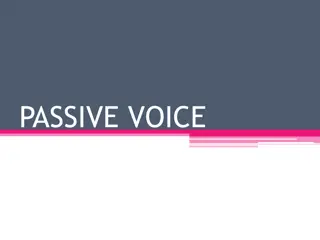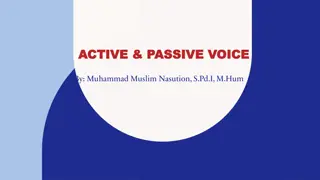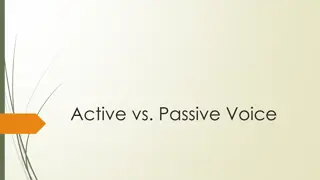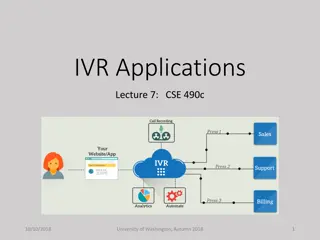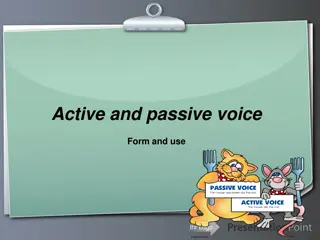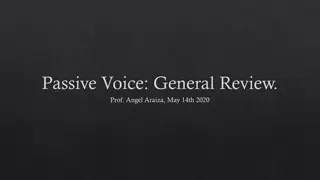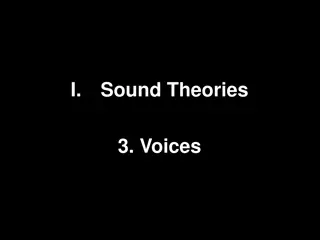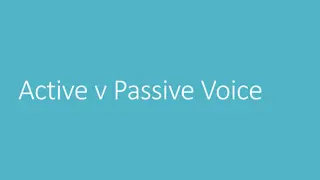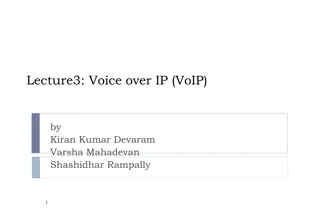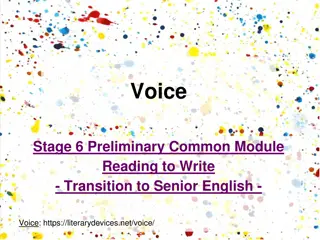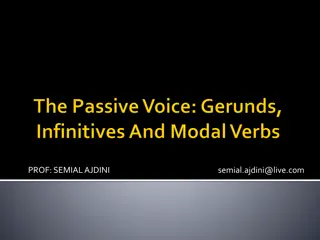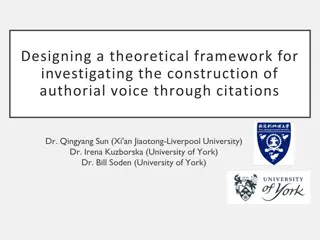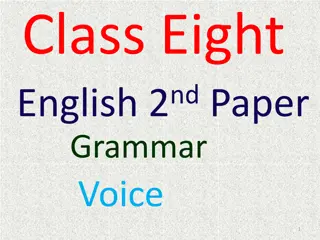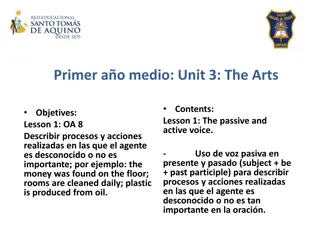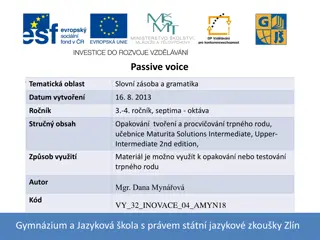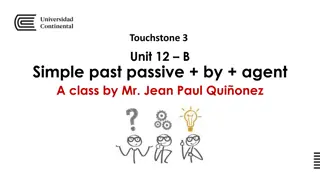Understanding the Concept of Voice in Literature
Voice in literature refers to the unique personality imparted by an author onto their work, defining how narrators convey stories. This piece explores the definition, types, functions, and roles of voice in literary works, focusing on the author's voice, character's voice, and the interaction between speaker, audience, narrative, and narrator in poetry. It emphasizes the significance of voice in conveying messages, engaging readers, and shaping the overall impact of a literary piece.
Download Presentation

Please find below an Image/Link to download the presentation.
The content on the website is provided AS IS for your information and personal use only. It may not be sold, licensed, or shared on other websites without obtaining consent from the author. Download presentation by click this link. If you encounter any issues during the download, it is possible that the publisher has removed the file from their server.
E N D
Presentation Transcript
Voice Stage 6 Preliminary Common Module Reading to Write - Transition to Senior English -
Definition A voice in literature is the form or a format which narrators use to tell their stories. It is prominent when a writer creates a sense that the character is a real person conveying a specific message that the writer intends to convey. In simple words, it is an author s individual writing style or point of view. When a writer engages personally with a text, he imparts his personality onto that piece of literature. This individual personality is different from other individual personalities that other writers put into their own works. Thus, voice is the unique personality of a literary work. Depending upon the type of work, authors may use a single voice, or multiple voices. Voice: https://literarydevices.net/voice/
Types of Voice There are many types of voices but there are two major ones. Author s Voice Author s voice is his particular style he employs in that particular story of a piece of writing. Character s Voice A character s voice is the voice of any character and how he/she views the world. It is a common narrative voice used with first and third person point of views, and the author consciously uses a specific character as a narrator in the story.
Function of Voice While identifying the function of voice in literature, it is necessary to consider the narrator s degree of objectivity, reliability and omniscience. Voice determines whose eyes readers see the narrative through and the personality given to a literary piece. Moreover, a strong voice helps make every word count, sets up consistency and most importantly grabs the attention of the readers.
Speaker and Voice Speaker/ Audience All poems have a voice, which can be called a speaker or persona (or in some case speakers/personas, if there is more than one person speaking the poem). Who tells the poem? Are there things you can say about the speaker s personality, point of view, tone, society, age, or gender? Does the speaker assume a persona at any point in the poem, and speak as a particular person (e.g., I am Lazarus, come from the dead . . . I shall tell you all )? Does the speaker seem attached or detached from what is said? What effect do the speaker s characteristics have on the poem? Likewise, all poems have a silent or implied listener/reader, an audience. Is it possible to figure out to whom the poem is addressed? Is there an ideal listener/reader? Does the speaker seek anything from the listener/reader (sympathy, support, agreement, and so on.)?
Narrative / Narrator. Poems capture thoughts, ideas, feelings, impressions, experiences, and incidents, but sometimes poems also tell a story. Ask yourself: What is happening in the poem? What action, drama, or conflict is present? Is there more than one event in the poem? Does anything change in the poem (is an action completed, does an attempted action fail, or does someone change in an important way)? Who tells the story, and what relationship does the narrator have to the story? Using one of the poems below, answer all questions for Speaker & Voice slides. I Wandered Lonely as a Cloud (Daffodils) William Wordsworth Degrees of Gray in Philipsburg Richard Hugo She Walks in Beauty Lord Byron
Different Voices in Poetry The Little Mute Boy
Who is the I in your poems? If a poet writes I in a poem, to whom are they referring? Sometimes, it might be clear that they are referring to themselves. Sometimes, they might be referring to a fictional or historical character that they have taken on the voice of. Or, the I might not be a character exactly, but a voice that moves the action or thought along, often called a narrator or speaker. Over the course of a poem, an I might change, referring to several different people. The I might not even be a person at all, but an object or an idea. If, for example, you met climate change in the street, how would it speak? How would your house speak? Your own shadow? Your future self? There are lots of reasons for writing in many voices. Mixing up the I might allow you to say things you couldn t otherwise say. Different voices can also be like instruments in an orchestra, adding layers of sound and tone. And the pleasure of reading a crowded poem can be like the (sometimes guilty) pleasure of sitting in a crowded train station listening in on other people s conversations.
Poem in three voices 1. Read The Little Mute Boy by Spanish poet Federico Garc a Lorca (1898-1936), translated by the contemporary American WS Merwin. 2. The Little Mute Boy: https://www.poets.org/poetsorg/poem/little-mute-boy
How many voices do you think there are in this poem? Highlight them. There are three. The narrator, who says things about the little boy, The little boy himself, whom the I refers to. Another voice, which seems to know things that neither of the other voices does, such as where the mute boy s voice is. The poem draws the reader in to feel as if they are sharing a secret with this voice. 3. Imagine three voices: (1) someone who has lost something important to them either solid, like a watch, or abstract, like a voice or a memory; (2) a narrator telling the story about the person who has lost something; and (3) someone who knows where the lost thing is hidden, and who will tell the reader in lines put in brackets.
4. Spend ten minutes writing as if you were the person who has lost something important. Don t worry too much about how it sounds at the moment, but write as clearly as possible. How do you feel about the lost thing? What does it look, smell and feel like? What will happen if you don t get it back? 5. On a new sheet of paper, spend ten minutes writing as the narrator. 6. Do the same for the person who knows the secret. 7. Read through what you have written. Underline arresting lines. 8. On a new sheet, write out lines from your three voices, arranging them together as a poem. Think about what you want the reader to know, and when. What story are the voices telling? Which voice should have the first line and which one the last? 9. When you are satisfied, write your new poem. Next lesson, look at it again. Cut out as many words as you dare. 10. Finalise your composition.


